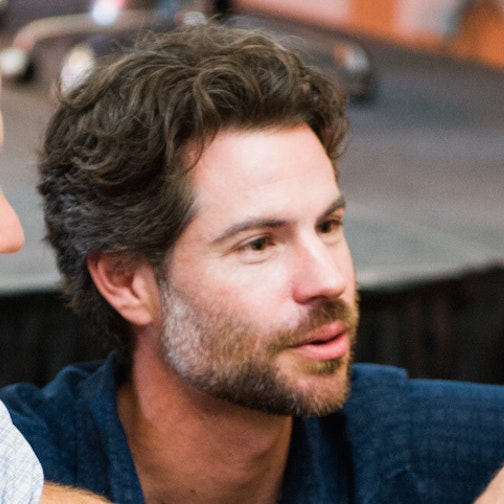The Monsters of Bruno Latour
Frankenstein's True Lesson
-
-
Share
-
Share via Twitter -
Share via Facebook -
Share via Email
-
As an archetype, Frankenstein is buried so deep within our psyches that simply attaching the first half of its name to any other word is enough to invoke a vivid image. Frankenfoods. Frankenfish. What we see in our heads are terrible mutants, hybrids of machine and man run amok -- a cautionary tale against technological hubris.
But according to Bruno Latour, France's most influential living intellectual since the death of Jacques Derrida in 2004, we have Frankenstein all wrong. The man -- Dr. Frankenstein -- was not the monster. And Dr. Frankenstein's sin was not his hubris to create life but rather his fright that led him to abandon rather than care for his creation.
And therein lies the true lesson for anyone who cares about the future of the planet: love and raise your technologies as though they were your children. So argues Latour in a new essay for the Breakthrough Journal, "Love Your Monsters," which has significant implications for the future of green politics, the precautionary principle, and controversial new technologies like genetically modified crops and next generation nuclear energy.
Latour has been writing about environmentalism -- écologie politique --since his 2004 book, The Politics of Nature, in which he lambasted politics done in the name of "Nature" as naive. "France, for its part, has never believed in the notion of a pristine Nature that has so confused the 'defense of the environment' in other countries,' Latour writes in his Breakthrough Journal article, aimed at an American audience. "What we call a 'national park' is a rural ecosystem complete with post offices, well-tended roads, highly subsidized cows, and handsome villages."
But if nature is more than Yosemite -- if it is everything and thus nothing -- then how could mere scientific descriptions of it ever guide human behavior? It was this insight -- that science is an intrinsically value-laden and political enterprise, not a simple representation of reality -- that catapulted Latour to fame with his now-classic 1979 Laboratory Life (written with British sociologist Steve Woolgar), an ethnography of how scientific facts were constructed at the Salk Institute in San Diego. Because so much experiment data is inconclusive, Latour and Woolgar observed, scientists were constantly making subjective decisions about what data was right and worth keeping, and what data was wrong and should be thrown away. Just because scientific facts are made up doesn't make them false; on the contrary, Latour and Woolgar argued, it makes them true.
At one end of the truth scale are assumed facts about reality -- so well constructed as to become autonomous -- and at the other are wild speculations. The authors weren't trying to understand how human subjectivity resulted in bad science. They were trying to understand how subjectivity resulted in good science. (Their study was aided by the fact that Jonas Salk himself authored the book's introduction).
During the science wars of the 1990s, Latour came under harsh criticism from some in the United States, including the philosopher John Searle, who accused him of being a relativist, and Alan Sokal. Like Derrida, Latour employs mischievous means to deadly serious ends. Nothing so upset American scientists like Sokal than Latour's insistence that Pharaoh Ramses could not have died of tuberculosis because tuberculosis had not yet been invented. To Latour's critics, this was reality-denying relativism.
But for Latour, who is today professor and Vice President of Research at Sciences Po, one of the most prestigious universities in Europe, what is unreal is to erase the historical contingency and subjectivity of science, and the social forces that shape it. There is no TB without its construction through scientific discourse and practice. The accusation that upsets Latour the most is that his writings are anti-science, or anti-scientist. In truth, Latour said, he loves science for what it actually is -- messy, political, impure, and subjective -- not for what it claims to be.
The 2010 "Climategate" episode -- the unauthorized release of emails from Britain's East Anglia University's Climate Research Unit -- vindicated much of Latour's work. Those emails showed climate scientists engaging in precisely the kind of subjective conversations over what what data was relevant and what data should be thrown away. It showed the scientists engaging in small-p politics -- strategizing, for instance, about how to keep articles they disagreed with out of mainstream scientific journals. Skeptics pointed to the emails as evidence that scientists make up facts -- and thus that global warming is not happening. Defenders of climate science defensively insisted that the emails revealed absolutely nothing of importance. But by idealizing climate scientists as dispassionate, objective, and neutral voices, liberal policy makers and environmentalists made it easy for skeptics to dismiss the whole of climate science on evidence of their passions and politicking.
Now, in "Love Your Monsters," Latour, who is a 2010 Breakthrough Senior Fellow, turns his gaze squarely to the question of technology to protect the planet from ecological crisis. Where many American environmental philosophers draw on the German philosopher Martin Heidegger to reject technological solutions as one-dimensional, Latour rejected Heidegger's assumptions in We Have Never Been Modern. Technology does not disenchant the world, Latour argued, depriving it of mystery and magic and spirit. "The gods are in here, too," Latour quotes the Greek philosopher Heraclitus saying, in reference to human made machines.
In a world made by humans, the "precautionary principle" -- long evoked by greens to argue against any innovation unless it can be proven 100 percent safe -- must be reformed, Latour writes. Our technologies, like our children, will go wrong. They will create new problems. We cannot create perfectly formed new technologies, only flawed ones. We must, thus, continually care for and improve them, just as we do our children.
"He who fights with monsters," Nietzsche famously warned, "should be careful lest he thereby become a monster." Latour not only cautions us against fighting them, he also insists that we learn to love them.
Read the full essay here.


